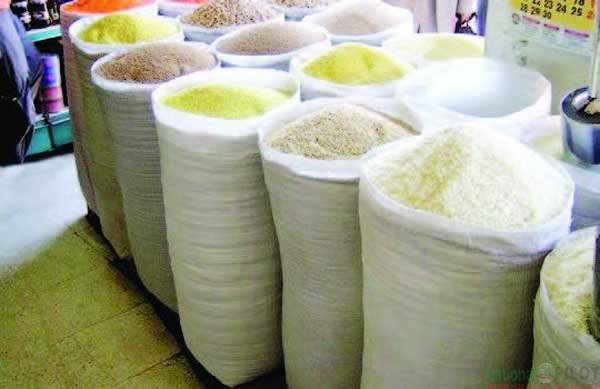Rice now sells for N30,000 per bag in Kwara

By Mike Adeyemi
The cost of goods in markets in Kwara State continues to rise and this in turn has affected the traders’ profit margin, National Pilot learnt.
The rising cost price of food items in Kwara market according to traders who spoke with our reporter attributed it to the grappling economy, the foreign exchange rate and insecurity that have impacted food prices, even making it a difficult task for banks supporting the nation’s economy from collapsing.
Kwara State in recent times, has experienced incessant high inflation rate, one that have resulted to high level of poverty, food crisis and price hike.
The daily increment in the cost price of goods, edible and non-edible products has taken a toll on the finance of consumers and traders; this has therefore created fear amongst citizens who earn less and spend more.
The problem created by the rising prices of goods and services leading to higher cost of living has become too difficult for the government to solve.
This period, fixed amounts of money buy less quantity of goods and services. The real value of money is drastically reduced thus the purchasing power of consumers are reduced too.
At the popular Mandate Market, a trader, Afusat Kasali affirmed that there are goods whose prices are at reasonable level before the sudden surge which has badly reduced the supply of such goods.
“There are goods that are sold at reasonable amount before, but now, their prices have risen drastically and their supply are very low. Sales have been affected due to the rise in the cost of major goods resulting to the reduction in the purchasing power of buyers,” she said.
At Yoruba Road Market, there is an increment in the cost price of rice; foreign and local rice. Traders at the market attribute the high cost of foreign rice to the foreign exchange rate especially the dollar rate.”
Now, a bag of foreign rice sells from N30,000 upwards for the long grain while small grain is sold from N29,000 and below. But some traders sell bellow this price so as to restock their shop and attract new customers.
For local rice, a bag is sold from N25,000 and below, and the ones that are not very neat are sold from 23,500, N22,000 and below. Before now, a bag of foreign rice cost N26,000 and N27,000, while a bag of local rice is sold from N24,000 and N23,000 and below.
As it stands, traders revealed the cost of purchase of rice would go higher if nothing is done to the foreign exchange rate that is currently higher than the nation’s currency.
For beans, traders attribute the hike to the rising insecurity in the country and high cost of transportation as well but others are of the opinion that the supply also led to its inflating cost.
Oloyin beans is packaged in a small sized bags and are sold from N27,000 in September but now, they are sold from N30,000 upwards.
At the market, a bag of beans in previous weeks was sold from N70,000 upwards and some traders insist their price is given at N80,000 upwards; but this week at the market, a bag of beans is sold from N85,000 upwards as traders disclosed that the supply is low, adding that the economic situation of the country is another factor affecting the pricing.
At Emir’s Market (Oja-Oba), Yusuf Kadijat, lamented fluctuations in the prices of commodity including cooking oil among others.
“The cost of cooking oil in recent times is higher due to the rise in the general price of goods in the market. Sometimes it reduces and at other times it increases.
“The dollar rate affects cooking oil prices in the country especially the branded ones and now, even the refill are sold at a very high rate. There are different types of cooking oil; the branded ones are often very expensive and the ones that are not branded are a bit affordable, ” Kadijat confirmed.
A 25-litre of good and well processed palm-oil is sold by some traders from N21,000 upwards and some sell from N22,000 upwards and a 25-litre of groundnut-oil is sells from N20,000 and N21,000 and above.





